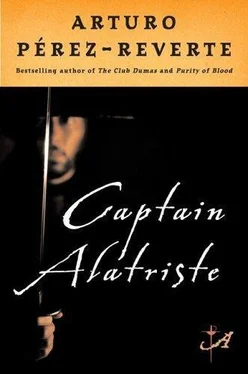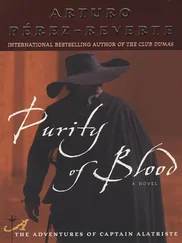Arturo Perez-Reverte - Captain Alatriste
Здесь есть возможность читать онлайн «Arturo Perez-Reverte - Captain Alatriste» весь текст электронной книги совершенно бесплатно (целиком полную версию без сокращений). В некоторых случаях можно слушать аудио, скачать через торрент в формате fb2 и присутствует краткое содержание. Жанр: Старинная литература, на английском языке. Описание произведения, (предисловие) а так же отзывы посетителей доступны на портале библиотеки ЛибКат.
- Название:Captain Alatriste
- Автор:
- Жанр:
- Год:неизвестен
- ISBN:нет данных
- Рейтинг книги:3 / 5. Голосов: 1
-
Избранное:Добавить в избранное
- Отзывы:
-
Ваша оценка:
- 60
- 1
- 2
- 3
- 4
- 5
Captain Alatriste: краткое содержание, описание и аннотация
Предлагаем к чтению аннотацию, описание, краткое содержание или предисловие (зависит от того, что написал сам автор книги «Captain Alatriste»). Если вы не нашли необходимую информацию о книге — напишите в комментариях, мы постараемся отыскать её.
Captain Alatriste — читать онлайн бесплатно полную книгу (весь текст) целиком
Ниже представлен текст книги, разбитый по страницам. Система сохранения места последней прочитанной страницы, позволяет с удобством читать онлайн бесплатно книгу «Captain Alatriste», без необходимости каждый раз заново искать на чём Вы остановились. Поставьте закладку, и сможете в любой момент перейти на страницу, на которой закончили чтение.
Интервал:
Закладка:
I had been allowed to accompany them, and had just run some errands at the Estafeta. The rest of the group had already gathered: Licenciado Calzas, Juan Vicuna, Domine Perez, and a few acquaintances who chatted at the railing of the steps overlooking Calle Mayor. The bone they were chewing was the latest impertinence of Buckingham, who—they had on good authority—had the brass to be disporting himself with the wife of the Conde de Olivares.
"Perfidious Albion!" declaimed Licenciado Calzas, who had not been able to abide the English for years. Once, returning from the Indies, he had come close to being captured by Walter Raleigh, a corsair who had splintered a mast and killed fifteen men.
"Harsh treatment," opined Vicuna, making a fist with his one remaining hand. "The only thing those heretics understand is harsh treatment. So that is how he repays the hospitality of our lord and king!"
Those grouped around him nodded circumspectly, among them two purported veterans with fierce mustaches who had never heard a harquebus fired in their lives; two or three idlers; a tall student from Salamanca named Juan Manuel de Parada, or de Pradas, who was wrapped in a threadbare cape and whose face spoke of hunger; a young painter recently arrived in Madrid and recommended to Don Francisco by his friend Juan de Fonseca; and a cobbler from Calle Montera named Tabarca, famous for leading the mosqueteros —the rowdy hoi polloi at the theater who stood in the open space at the back of the yard to watch the play, applauding or whistling their disapproval and thereby determining its success or failure. Although of lowly birth, and illiterate, this Tabarca was a man to be reckoned with. He presented himself as a supreme authority, an old Christian and hidalgo down on his luck—as nearly everyone was—and because of his influence among the rabble in the open-air theaters, he was flattered by authors attempting to make their name at court, and even by some who already had.
"At any rate," Calzas put in with a cynical wink, "I have heard that the wife of the favorite is not a bad judge of blades. And Buckingham is a fine specimen of a man."
Domine Perez was scandalized. "Please God, Senor Licenciado! Curb your tongue. I know the lady's confessor, and I can assure you that Sefiora dona Ines de Zufiiga is a pious woman. A saint."
"And saints," Calzas impudently replied, "always get a rise out of our king."
He laughed maliciously, watching the domine cross himself as he looked nervously around. For his part, Captain Alatriste was frowning at Calzas disapprovingly for speaking so frankly in my presence. The likable young painter named Diego de Silva, a Sevillano with a heavy accent, was observing us as if wondering what he had gotten himself into.
"With your leave, Your Mercies," he began timidly, lifting an index finger stained with oil paint.
But no one paid much attention to him. Despite his friend Fonseca's recommendation, Don Francisco de Quevedo had not forgotten that the minute the young artist reached Madrid, he had painted a portrait of Luis de Gongora, and although he had no reason not to like the youth, he meant to purge that capital sin by ignoring him for a few days. Although the truth is that Don Francisco and the young Sevillian were soon as thick as thieves, and the best portrait we have of the poet is precisely the one that the same young man later painted. Over time, he also became a very good friend to Diego Alatriste and to me, but that was when he was better known by his mother's family name: Velazquez.
Well, then. I was telling you that after the painter's unfruitful attempt to intervene in the conversation, someone brought up the question of the Palatinate, and everyone dived into an animated discussion of Spanish politics in central Europe, in which the cobbler Tabarca threw in his jack of spades with all the assurance in the world, giving his opinion on Maximilian of Bavaria, the Prince Elector of the Palatinate, and the Pope of Rome, who, it was generally agreed, had a secret agreement. One purported miles glo riosus (and here a bow to Plautus) swore that he had the latest word on the matter, passed on to him by a brother-in-law of his who served in the palace ... but that conversation was interrupted when all the men, except the domine, leaned over the railing to greet some ladies passing in an open carriage. Buried in a pouf of skirts, brocades, and farthingales, they were on their way to the silver shops at the Guadalajara gate: they were harlots, but very high-class harlots. In our Spain of the Austrias, even whores put on airs.
The men donned their hats again and continued their conversation. Quevedo, who was not listening very carefully, moved a little closer to Alatriste and pointed his bearded chin toward two individuals standing some distance away.
"Are they following you, Captain?" he asked in a low voice, looking off in the opposite direction. "Or are they following me?"
Alatriste chanced a discreet glance toward the pair. They had the look of bailiffs, or hired "problem solvers." When they realized they were being watched, they turned slightly away.
"I would say that they are following me, Don Francisco. But considering your verses, one never knows."
The poet looked at my master, frowning. "Let us suppose that it is you. Is it serious?"
"It may be."
"By my oath, it must be so. In that case there is no choice but to fight! Do you need my assistance?"
"No, not at the moment." The captain studied the swordsmen through half-closed eyes, as if attempting to engrave their faces in his memory. "Besides, you have enough trouble without taking on mine."
For a few seconds Don Francisco said nothing. Then he twirled his mustache and, after adjusting his eyeglasses, stared openly, angrily, at the two strangers. "In any case," he concluded, "if there is a challenge, two and two would make an even fight. You may count on me." "I know," said Alatriste.
"Ziss, zass.'We will take care of them." The poet rested his hand on the pommel of his sword, which was poking up the hem of his cape. "I owe you that much, and more. And my maestro is not exactly Pacheco."
The captain shared his malicious smile. Luis Pacheco de Narvaez was reputed to be the best fencing master in Madrid, having become the instructor of our lord and king. He had written several treatises on weapons, and once when he was in the home of the president of Castile, he had argued with Don Francisco de Quevedo about several points and conclusions. As a result, they took up swords for a friendly demonstration, and Don Francisco made the first move, striking Maestro Pacheco on the head and dislodging his hat. From that moment on, the enmity between the two men was legend: one had denounced the other before the tribunal of the Inquisition, and that one had portrayed him, with little charity, in The Life of a Petty Thief Named Pablos, which although it was printed two or three years later, was already circulating in manuscript copies throughout Madrid.
"Here comes Lope!" someone said.
To a man, they doffed their hats when the great Felix Lope de Vega Carpio was seen strolling toward them amid the greetings of people standing back to let him pass. He paused a few moments to converse with Don Francisco de Quevedo, who congratulated him on the play to be performed the next day in El Principe. Diego Alatriste had promised to take me to this important theater event, the first play I would see in my life. Then Don Francisco made some introductions.
"Captain Don Diego Alatriste y Tenorio ... You already know Juan Vicuna. . . . This is Diego de Silva. . . . The lad is Inigo Balboa, son of a soldier killed in Flanders."
When he heard that, Lope patted my head with a spontaneous gesture of sympathy. It was the first time I had seen him, although I would later have other opportunities. I will always remember him as a grave sixty-year-old with distinguished bearing, a dignified figure clad in clerical black, with a lean face, short, nearly white hair, gray mustache, and a cordial, somewhat distracted, almost weary smile that he bestowed on one and all before continuing on his way, surrounded by murmurs of respect.
Читать дальшеИнтервал:
Закладка:
Похожие книги на «Captain Alatriste»
Представляем Вашему вниманию похожие книги на «Captain Alatriste» списком для выбора. Мы отобрали схожую по названию и смыслу литературу в надежде предоставить читателям больше вариантов отыскать новые, интересные, ещё непрочитанные произведения.
Обсуждение, отзывы о книге «Captain Alatriste» и просто собственные мнения читателей. Оставьте ваши комментарии, напишите, что Вы думаете о произведении, его смысле или главных героях. Укажите что конкретно понравилось, а что нет, и почему Вы так считаете.










